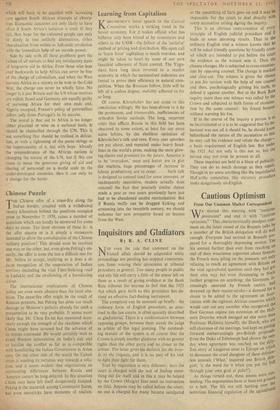Inquisitors and Gladiators
By R. A. CLINE NOT even the rule that comment on the Vassall affair should be suspended while proceedings arc pending has stopped commenta- tors from voicing their uneasiness at tribunal procedure in general. Too many people in public and city life still carry a little of the smear left on them as a result of giving evidence at the Bank Rate tribunal for anyone to feel that the 1921 Act which gave birth to this procedure has de- vised an effective fact-finding instrument.
The complaint can be summed up briefly: the ordinary form of English procedure, as prac- tised in the law courts, is often quaintly described as gladiatorial. There is a confrontation between opposing groups; between them stands the judge as arbiter of this legal jousting. The outstand- ing feature of the system is of course that the Crown is simply another gladiator with no greater rights than the other party and no closer to the arbiter. The latter gives his decision for the bene- fit of the litigants, and it is no part of his task to fight their fight for them.
Trial by inquisition is very different: here the court is charged with the task of finding some- thing out for itself and in this it may be helped by the Crown (Maigret fans need no instruction on this). Anyone may be called before the court; no one is charged but many become inculpated
as the unearthing of facts goes on ,and it may be impossible for the court to deal directly with every accusation arising during the inquiry.
This is an obvious contravention of every principle of English judicial procedure and it leads to some alarming results. Thus in the ordinary English trial a witness knows that he will be asked friendly questions by friendly coun- sel which are intended to put befOre the court the evidence as the witness sees it. Then the climate changes. He is subjected to cross-examina- tion by opposing counsel. The change is marked and clear-cut. The witness is given the chance to put his version with the help of one counsel and then, psychologically gritting his teeth, to defend it against another. But at the Bank Rate inquiry more than one witness was called by the Crown and subjected to both forms of examina- tion by the same counsel: his friend became without warning his foe. If in the course of the inquiry a person is to be incriminated or it is to be suggested that his be- haviour was not all it should be, he should know beforehand the nature of the accusation so that he may call his evidence and refute the charge-- a basic requirement of English law. But under the 1921 Act not only is this not so, but the person may not even be present at all. These inquiries are held in a blaze of publicity. They can do as much damage as they repair. Though in no sense anything like the inquisitorial McCarthy committee, this statutory procedure looks dangerously un-English.










































































 Previous page
Previous page